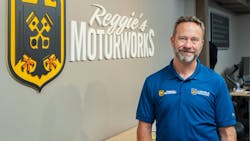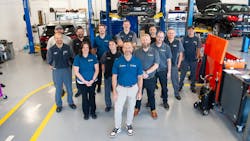From eBay Parts to Multi-Shop Success: Reggie Stewart’s Journey
Cars? Check. Entrepreneurship? Check. For Reggie Stewart, who found two areas he was passionate about in the automotive repair business, the marriage of the two wasn't always so simple. As a business owner, there’s a lot more to a repair shop than just working on the cars. It becomes about you learning what to do so you can provide the resources needed for those repairs to happen.
With a humble, optimistic attitude, Stewart took a $1,000 loan from a friend in the early 2000s and got to work on some derelict BMWs in an pole barn to sell parts on eBay. He found success in auto repair that only continued to grow, partly because Stewart took steps to keep that momentum going and built up the strongest parts of his business.
A Born Entrepreneur
In 2006, Stewart made money working as a DJ and selling cell phones and other electronics on the side. One of his contacts, a towing company, had derelict cars that they sold at auction every week. Stewart eventually had the idea to buy an old BMW 3 Series from them, which he fixed up with his buddy and started taking to events at the local BMW club.
The parts of the vehicle they removed ended up being sold by Stewart on eBay. The online marketplace was growing in popularity at the time, and Stewart started to see potential to do something more with it.
“I knew there was an opportunity there, and I'm hardwired as an entrepreneur to look for opportunities," Stewart says.
He made a pivot, quitting his job and dedicating himself to selling automotive parts. But with little money, he needed a little help to get there.
“I'm broke—I had very little money. So, I borrowed $1,000 from my best friend, bought three old, derelict cars, and then rented half of a pole barn from another one of my old clients,” Stewart says.
Stewart got to work taking the vehicles apart himself and selling the parts online. In the cold Indiana February, in a barn with no heat or plumbing, he was happier than ever to be embarking on a new adventure.
Within a couple of years, Stewart had sold parts to every continent except Antarctica. He was selling all over the world to clients seeking older, American vehicle parts that Stewart was able to acquire. He was also becoming close with the local BMW enthusiast community, who had been purchasing parts from him and even having Stewart install them.
Outgrowing His Place
Around 2009, Stewart met a technician looking for work and brought him into his operation. Not only was he a technician, but also a former shop owner, and through him, Stewart began to understand even more about the automotive industry.
Stewart’s business kept growing and growing. By 2010, he needed to hire another technician to help, and he began to see the potential to expand the repair side of his operations. Within a year, he moved the business to a better location and began operating Reggie’s Motor Works as his new auto repair shop.
Though one technician came with him at first, he soon had to leave and left Stewart to work solo. He hired a service advisor a couple of months later, but it would be much longer before he could figure out how all the other pieces of his business fit together.
“From 2011 to about 2015, I started hiring people, beating my head against the wall, and was figuring things out,” tells Stewart.
Things changed in a major way for him in 2015, though, once he sought out the help of a professional coach. He began understanding how to make the business more profitable and desirable for his customers and employees.
Part of that has involved him realizing that there’s much more to owning an auto shop than just working on vehicles. Much of his time is taken up by other factors that allow the business to run functionally.
When the shop originally started, it focused on vintage BMWs, but eventually expanded to service all BMWs, and now works on all European models. That expansion was the result of Stewart reflecting and seeing that his customer base needed more than just vintage BMW repairs, and that his ultimate motivation was to be a successful business owner.
“I kind of follow the money, but the money is based on what people want and need the most, and what people in my area want and need the most is general maintenance and repair on late model cars,” explains Stewart. “For a while, I tried to force that restoration and performance side. And it was like pushing a big rock up a hill. There was some of that work, but it was always difficult. After working through a couple of different coaches, I finally resigned to the fact that the business that supports my family, my life, and the people that work for me is service and repair.”
Stewart’s business began to grow so much that by 2020, he rented a building next to his existing shop and made it into another shop that would service all makes and models, called The Noble Mechanic. He’s since expanded that brand to a second store and oversees a total of three auto stores.
Working on the Business—Not Just Cars
As his business grew, Stewart had to continually reflect and challenge himself to improve. Starting as a small-time technician taking cars apart in a barn is a far cry from the $3.2 million in sales he now makes. Now that he has brand recognition, a customer base, and trust built in the community, he’s had to learn that selling at the lowest prices won't always translate into the best service possible.
For Stewart, it could sometimes mean he would be helping low-income vehicle owners struggling to afford necessary repairs, but much of his time was spent dealing with customers who were simply looking to split hairs.
“Once I transitioned to being a more higher-end, convenience-based business, life got a lot easier,” adds Stewart.
Additionally, Stewart oversees a far bigger team of people now and has to provide competitive pay and benefits to secure the best technicians he can find.
“One of my big drivers is being able to pay my people very well and provide them great benefits. On one hand, I have to, because I can't get quality people if I can't compete with the big guys. On the other hand, that's the reward for doing this work: knowing that you can support highly skilled people.
“When I have a holiday party and I have all these people and their families that show up, and you do that group picture, and have 50 or 60 people there, and you realize that you're the one that's helping them all make sure they have Christmas presents under the trees for their kids—that's when the light bulb goes off as to the power of what we're doing.”
Like many shop owners, Stewart is driven to run a successful business because of the talent he employs, who depend on him to provide what they need to thrive. Over the years, he’s only expanded the number of people on his team across each of the three stores and has even created new roles to help ensure a healthy, vibrant company culture.
When Stewart first interviewed his shop’s marketing and events coordinator, the applicant was interviewing for a service advisor position. It wasn’t until Stewart looked over his resume and saw his extensive experience in graphic design that he had an idea for how such talents could be used in his business.
“I was paying some marketing companies to do social media for me, and it was like a light bulb went off,” recalls Stewart. “I thought, ‘Man, this guy could probably do this a whole lot better than I can, and definitely better than some third party that's not on the premises.’ Plus, he's a car enthusiast to boot—so I basically made up a position for him.”
The result was tremendous. Stewart’s new marketing and events coordinator took over the shop’s social media, becoming responsible for creating content and keeping the shop looking nice. He’s curated campaigns including posts for employee birthdays each year, and updates recognizing staff accomplishments.
It’s been pivotal in not only boosting employee morale but also building community trust as well.
“That's something I get a lot of compliments on from people in the community. Like, ‘hey, it's amazing the way you celebrate your people,’” shares Stewart. “And I'm like, ‘well, without my people, I don't have anything.’ I'm just a guy, right? I can only fix a couple cars; I can't do what everybody here does. So, we have to recognize them.”
On top of that, the marketing and events coordinator has implemented internal communication throughout all three of Stewart’s shops through Microsoft Teams. Employees often wish one another a happy birthday or anniversary through the platform, which further solidifies the bond between team members.
The success of Stewart’s shop has all resulted in him fully realizing his role as a shop owner. Even better, he now has enough time to pursue his passion for working on vintage BMWs in his own spare time.
He has it all, but it was only possible through humility and a willingness to surround himself with others and learn from them.
“Once you start your shop, keep talking to successful shop owners. Because if you're humble, coachable, and willing to learn, your progress is going to happen so much faster than if you jump into it thinking you already know everything,” says Stewart. “Be a sponge.”
About the Author
Kacey Frederick
Associate Editor
Kacey Frederick joined as the assistant editor of Ratchet+Wrench in 2023 after graduating from the University of Arkansas at Fort Smith with a bachelor’s in English and a minor in philosophy.
The grandchild of a former motorcycle repair shop owner, he’s undergone many trials and tribulations with vehicles. Now the proud owner of a reliable 2011 Toyota Camry, he works to represent those in the repair industry that keep him and so many others safely rolling on.


